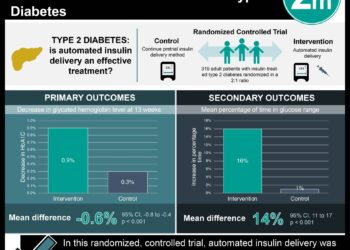Lifestyle interventions can reduce type 2 diabetes among high-risk patients
Image: PD
1. Based on this systematic review, the use of comprehensive lifestyle interventions significantly reduced the incidence of Type 2 diabetes mellitus (DM) among high-risk patients.
2. There is insufficient evidence to support the benefit of lifestyle interventions on cardiovascular or microvascular outcomes among patients with already established Type 2 DM.
Evidence Rating Level: 1 (Excellent)
Study Rundown: Type 2 DM is an increasingly prevalent disease and a leading cause of death in the United States. This recent systematic meta-analysis assessed the impact of comprehensive lifestyle interventions in both patient populations at risk for Type 2 DM as well as patients with an already established diagnosis of Type 2 DM. In this study, two independent researchers selected 20 unique studies for analysis. The analysis found that among patients that are high risk, diet and exercise lifestyle interventions were associated with a statistically significant decrease in the development of Type 2 DM. However, there was not sufficient evidence to demonstrate benefit in cardiovascular outcome in this patient population. Among the patients with an established diagnosis of Type 2 DM, the analysis did not find evidence to support lifestyle interventions in improving all-cause mortality, cardiovascular outcomes and microvascular complications. Overall, this systematic analysis provided moderate evidence to support lifestyle intervention for prevention in type II DM in high risk patients, but its results did not suggest a benefit for its application in patients with an already established diagnosis of Type 2 DM.
Click to read the study, published today in the Annals of Internal Medicine
Relevant Reading: Cardiovascular Effects of Intensive Lifestyle Intervention in Type 2 Diabetes
In-Depth [systematic review]: Two independent reviewers screened 1289 studies to find RCTs that tested the efficacy of lifestyle interventions, defined as a combination of diet, exercise, and at least one other component, in adults who had or were at risk to develop type 2 diabetes. The primary outcomes were death, CVD, and microvascular complications, and secondary outcomes were markers of diabetic progression, such as hemoglobin A1C. Among the 9 studies with high risk patients, 7 reported a statistically significant decrease in the development of type 2 diabetes, together with a risk ratio (RR) of 0.35 (p=0.02) at the end of intervention, which was maintained at follow up at 10 years (RR=0.80, p<0.001). The effect on CVD and other complications was not statistically significant. Among the 11 studies of patients with type 2 diabetes, there was a statistically insignificant trend towards decreased mortality with lifestyle interventions (RR=0.75, p=0.11). Other primary and secondary outcomes did not show statistically significant differences. The major weaknesses of this review was the low number of selected studies and an unknown degree of confounding by bias, as most patients were unable to be blinded by the trial design. Furthermore, the studies themselves had a high heterogeneity, both in type of lifestyle modification and outcomes followed. Overall, lifestyle intervention in decreasing the risk of type 2 diabetes among high risk patients is supported by moderate evidence, but its use in patients with disease does not have strong evidence.
By Sai Folmsbee and Aimee Li, MD
More from this author: Combination therapy with tofacitinib improves response in rheumatoid arthritis USPTF recommends tobacco counseling for adolescents by primary care physicians Peer-delivered education through social networking increases home-based HIV testing ACP recommends weight loss and CPAP for obstructive sleep apnea
© 2013 2minutemedicine.com. All rights reserved. No works may be reproduced without expressed written consent from 2minutemedicine.com. Disclaimer: We present factual information directly from peer reviewed medical journals. No post should be construed as medical advice and is not intended as such by the authors, editors, staff or by 2minutemedicine.com. PLEASE SEE A HEALTHCARE PROVIDER IN YOUR AREA IF YOU SEEK MEDICAL ADVICE OF ANY SORT.







